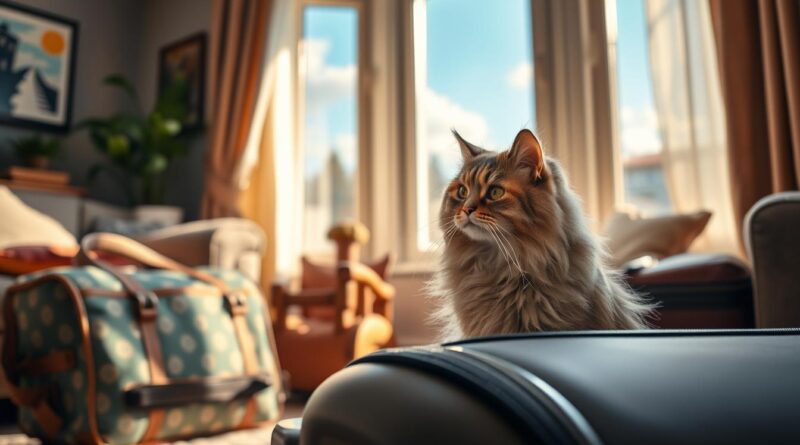Prevent Cat Separation Anxiety During Vacations
As pet owners, we love having our cats by our side. But when we go on vacation, leaving them can cause stress and anxiety. Separation anxiety in cats is common, but you can make them feel safe and happy while you’re away.
Key Takeaways
- Understand the causes and signs of separation anxiety in cats to better address the issue.
- Implement gradual departure training and utilize pheromone diffusers to help your cat cope with your absence.
- Engage your cat with interactive toys, puzzles, and enrichment activities to keep them mentally stimulated.
- Consider boarding facilities that cater to your cat’s needs to provide a safe and comfortable environment during your vacation.
- Utilize calming supplements and pheromones to help soothe your anxious feline friend.
Understanding Cat Separation Anxiety
Cats are social animals and can get anxious when their owners leave for a long time. This anxiety can cause them to act out in ways that worry their owners. It’s important to know what causes and signs of feline anxiety to help them feel better.
Causes of Separation Anxiety in Cats
Several things can lead to cat separation anxiety, including:
- Changes in routine or environment, such as moving to a new home or the introduction of a new family member
- Lack of socialization and exposure to different situations during the cat’s formative years
- Past traumatic experiences, such as abandonment or rehoming
- Underlying medical conditions that may exacerbate the cat’s stress levels
Signs of Separation Anxiety in Feline Companions
When a cat has separation anxiety, they might show different behaviors and signs of distress, such as:
- Excessive vocalization, such as meowing, crying, or howling
- Destructive behaviors, like scratching, chewing, or attempting to escape confinement
- Bathroom accidents outside the litter box
- Excessive self-grooming or other repetitive behaviors
- Refusal to eat or drink while the owner is away
Spotting these signs of feline anxiety can help owners take steps to help their pets feel better.
Preparing Your Cat for Your Absence
Getting your cat ready for when you’re away is key to avoiding cat separation anxiety on vacation. The trick is to slowly get your cat used to you leaving with gradual departure training.
Start by leaving for short periods, like a few minutes. Then, slowly make your time away longer. This pet care method makes your cat feel safer and less worried when you’re gone.
- Start with leaving for 5 minutes and then increase the time.
- Give your cat fun cat behavior toys and activities to keep them busy.
- Keep a regular routine so your cat knows what to expect.
This gradual departure training helps your cat feel more comfortable when you leave. Spending time on this now can really help reduce your cat’s stress. It makes your vacation less stressful for both of you.
“The key to preventing separation anxiety in cats is to gradually acclimate them to your absence through a structured training process.”
How to Prevent Cat Separation Anxiety During Vacations
Leaving your cat behind for vacations can be tough for both of you. But, there are ways to prevent separation anxiety and keep your cat happy while you’re away. Two effective methods are gradual departure training and pheromone diffusers.
Gradual Departure Training
Gradual departure training helps your cat get used to being alone. Begin by leaving for short times, like errands, and then get longer. This helps your cat feel okay when you leave and come back.
- Start by picking up your keys or putting on shoes, then come right back.
- Slowly make your “departures” longer, always coming back before your cat gets upset.
- Give your cat fun toys and activities to do while you’re away.
Pheromone Diffusers: A Calming Solution
Pheromone diffusers are great for easing cat separation anxiety. They release calming scents that help your cat relax and feel less stressed. Place these diffusers in your cat’s favorite spots to make their space more calming while you’re on vacation.
“Pheromone diffusers can have a remarkable effect on reducing anxiety in cats, providing a safe and effective solution for pet owners.”
Using gradual departure training and pheromone diffusers together can help your cat feel less stressed when you’re away. This ensures your cat’s pet care and happiness are top priorities during your vacation.
Enrichment Activities to Keep Your Cat Engaged
Keeping your cat entertained is key to avoiding separation anxiety when you’re away. Offer a mix of enrichment activities to keep their mind and body active. This includes interactive toys, puzzles, cardboard scratchers, and climbing structures.
Interactive Toys and Puzzles
Interactive toys and puzzles are great for keeping your cat’s mind sharp. They come in many forms, like treat-dispensing toys and puzzle feeders. These activities tap into your cat’s natural hunting and exploration instincts.
By engaging their senses and rewarding their curiosity, you can ease separation anxiety. This promotes positive, healthy behaviors in your cat.
Cardboard Scratchers and Climbing Structures
Cats need to scratch and climb, and giving them the right places to do so can reduce stress. Cardboard scratchers are perfect for this, as they let your cat scratch safely. Add sturdy climbing structures, like cat trees or wall-mounted shelves, for them to explore and climb.
By adding various enrichment activities to your cat’s space, you make it stimulating and fun. This keeps them active, entertained, and happy while you’re away. A well-enriched environment is essential for preventing separation anxiety and ensuring your cat’s happiness.
A bored cat is an anxious cat. Provide enrichment activities to keep your feline friend engaged and happy.
Boarding Facilities: A Safe Haven for Your Cat
Boarding facilities are a great option for your cat while you’re on vacation. They offer a safe, comfy, and fun place for your cat. This ensures your cat is well taken care of when you’re not around.
Choosing a good boarding facility has many benefits. They have staff who know a lot about cats and can meet your cat’s particular needs. They provide great food, clean spaces, and fun activities to keep your cat happy.
“The staff at the boarding facility were amazing. They took such great care of my cat, and I could tell she was happy and content during her stay.”
It’s important to pick a boarding facility with a good reputation. Look for places that offer:
- Clean, comfy, and safe spots for your cat
- Personal care and attention for each cat
- Fun activities and toys to keep your cat busy
- Vet services or easy access to a vet
- Good reviews from happy pet owners
By choosing a trusted boarding facility, you can relax knowing your cat is in good hands. It’s a great way to prevent cat separation anxiety and keep your pet happy while you’re away.
Calming Techniques for Anxious Felines
Keeping your feline friend calm when you’re away can be tough. But, there are ways to ease their anxiety. One effective method is using calming pheromones. These natural substances help your cat feel safe and relaxed, reducing stress.
Calming Supplements and Pheromones
There are also calming supplements for anxious cats. These products often include L-theanine, chamomile, or valerian root. They can help calm your cat and make them feel better when you’re not there.
“Maintaining a calm and comfortable environment for your cat is essential during times of separation. The right combination of calming techniques can make all the difference in their overall well-being.”
Start using these calming aids slowly and watch how your cat reacts. This way, you can find what works best for them. With some preparation, your cat can feel secure and happy, even when you’re away.
Returning Home: Reintroducing Your Cat
When you come back from vacation, it’s key to reintroduce your cat right. This calm, step-by-step approach makes your cat feel safe. It also keeps their routine smooth.
Start by spending quality time with your cat when you get home. Avoid rushing in and showering them with affection immediately. Let your cat start the interaction and rebuild your bond slowly.
Here are some tips for a smooth reintroduction:
- Stay calm and speak softly to reassure your cat.
- Give your cat their favorite treats or toys to make your return positive.
- Introduce your scent by placing a piece of your clothing in their favorite spot.
- Let your cat have space and come to you when they’re ready.
Using these reintroducing cat methods helps your cat feel secure. It makes coming home stress-free for both you and your pet. Remember, patience and a gentle touch are crucial for a successful reunion.
“The key to a successful reintroduction is to take it slow and let your cat set the pace. With time and care, your bond will be stronger than ever.”
By focusing on pet care and understanding your cat’s cat behavior, you can make their homecoming easy. A bit of effort and patience can make your cat feel safe and happy when you return.
Seeking Professional Help for Severe Anxiety
If your cat is really struggling with separation anxiety, it’s time to get help. Veterinarians and animal behaviorists can offer advice and support. They know how to help your cat feel better.
Seeing a professional can really change things for your cat. They’ll check your cat’s condition, find the cause, and make a plan to help. This plan will help your cat feel less stressed.
“The guidance of a veterinarian or animal behaviorist can be invaluable when dealing with a cat’s severe separation anxiety. Their expertise can make a significant difference in your pet’s well-being.”
Experts use specific techniques, medicine, and enrichment plans to help your cat. This way, your cat can feel calm and safe when you’re away. Getting professional help is key to your cat’s happiness.
Your cat’s happiness is most important. If you can’t handle their cat behavior issues alone, get help. With the right support, you and your cat can have a better life together.
Conclusion
Understanding the causes of prevent cat separation anxiety is key. By following the strategies in this guide, you can keep your cat happy while you’re away. Make sure your cat’s needs are met and they have a supportive space.
Managing cat behavior and preventing anxiety starts with gradual training. Use calming pheromones and keep them busy with fun activities. If needed, get professional help. These steps will keep your bond strong and your cat calm when you’re gone.
As a caring pet care provider, your cat’s comfort is crucial. With the right steps, your cat will feel safe and happy, even when you’re not there. Use these strategies and enjoy your vacation, knowing your cat is well taken care of.
FAQ
What are the common causes of separation anxiety in cats?
Cats can get anxious when their routine changes or if they’re not socialized well. Past scary experiences also play a big role. They get upset when left alone for too long.
How can I gradually prepare my cat for my absence during vacations?
Start by leaving for short times and then get longer. This makes your cat feel safer and less worried when you’re away.
What are some effective ways to keep my cat engaged and calm during my absence?
Give your cat fun things to do like toys and puzzles. Cardboard scratchers and climbing spots are great too. Pheromone diffusers can also calm them down.
Is it a good idea to consider boarding facilities for my cat during my vacation?
Yes, good boarding places offer a safe and fun place for your cat. They can help your cat feel less anxious and be well taken care of while you’re away.
What calming techniques can I use to help my anxious cat during my absence?
Try using pheromone diffusers and supplements to calm your cat. These natural methods can make your cat feel more relaxed and safe.
How should I reintroduce my cat when I return home from my vacation?
Come home calmly and slowly to reintroduce your cat. This helps them feel safe and keeps their routine smooth.
When should I seek professional help for my cat’s severe separation anxiety?
If your cat’s anxiety is really bad and doesn’t get better, get help from a vet or animal behaviorist. They can give you advice and support for your cat’s needs.




